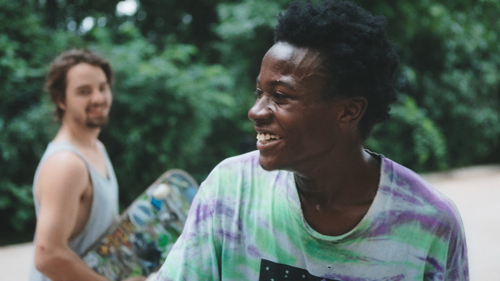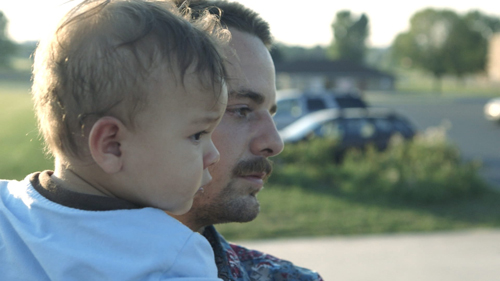
Your complimentary articles
You’ve read one of your four complimentary articles for this month.
You can read four articles free per month. To have complete access to the thousands of philosophy articles on this site, please
Films
Minding the Gap
Dylan Skurka on a film that suggests it’s possible to choose to overcome your upbringing.
Do we have free will, or are our lives just an amalgamation of forces beyond our control, pushing us around like billiard balls?
The question seems straightforward enough, but if you spend enough time with it you’ll soon find that you’ve opened up a Pandora’s box of philosophical questions, especially since each side of the debate has a peculiar way of seeming both perfectly plausible and implausible. It certainly feels like I’ve gotten where I am through choices that I’ve freely made; but how can I be so sure? Is freedom just an illusion – something I can tell myself I possess to avoid the terrifying fact that the events of my life are completely beyond my control? I can just as easily embrace my lack of control and situate myself on the determinist side of things; but would this just be a sly way of evading any responsibility for all the mistakes I’ve made? How could we possibly praise or blame anyone for anything if no one really has the ability to freely choose what they do? And so the vicious circle of thinking begins.

Skater bros Zack and Kiere
Film Images © Hulu/Magnolia Pictures 2018
Getting nowhere and feeling frustrated as hell about it, I found myself restlessly looking for answers – from having lengthy conversations with some of the smartest people I know, to reading the most eloquently defended positions from the world’s leading thinkers on the topic. All to no avail, of course.
Bouncing between the two sides of the free will vs determinism debate ad nauseam, I eventually became too jaded to think about it any further, and figured the debate itself was either meaningless, unanswerable, or a combination of both. But when I came across the 2018 documentary film Minding the Gap, the initial excitement I had for the debate was unexpectedly reawakened in a profound way.
The film follows the lives of three male skateboarder friends, Keire, Zack, and Bing, as they enter adulthood and struggle to make something of themselves in the process. Sounds normal enough, right? Where things begin to take a left-turn is when we start to get a sense of where these kids grew up: Rockford, Illinois. Rockford is revealed to be something of a sociological black hole – the kind of place you’d be lucky to make it out of in one piece – a place where its inhabitants are for the most part helplessly trapped in a terrible loop of poverty and trauma. This is so true of the film’s characters, in fact, that skateboarding is not so much a cool hobby for them as it is a means of survival, not so much a mildly delinquent pastime as a temporary escape from their bleak future prospects and abusive households. “Skateboarding is more of a family than my family,” Zack says early on in the film. “We formed a family together to look out for each other because no one else was looking out for us.”
Viewers can’t help but ask if the members of this makeshift family are merely going to become products of their suffocating environment, or if they will have the freedom to ultimately escape its grasp. In other words, Minding the Gap not only thoughtfully tackles the free will vs determinism debate, but shows the debate unfold through the lives of its characters. To this extent, watching Zack’s life take shape is as good an argument as any I’ve seen in favour of soft determinism. (Soft determinism says that some things in our lives, such as our character formation, are beyond our control. Hard determinism by contrast says that everything in life is absolutely predetermined from the subatomic level up, so that any sense of choice is an illusion.) Running away from his dysfunctional family from a young age, there’s something almost fateful about how the more aggressively Zack fights his upbringing, the more he imitates it by plunging himself into a downward spiral of premature fatherhood, heavy drinking, abuse, and, finally, absence. But even more disturbing than watching Zack’s own deterioration is thinking about what’s in store for his son. For now we see a baby boy too innocent to understand the extent of the chaos that surrounds him; but what’s next? Can a happy life really be on the table for someone who from the start lacks the guidance and support of a functional family? Or would it be so outlandish to think that the child is already potentially doomed to repeat the same mistakes as his father, and become yet another fatality of Rockford? This is the feedback loop of poverty and trauma made visible.
In spite of the apparent hopelessness of all the film’s characters, however, things turn out very differently for Keire and Bing. Rather than mimicking the dysfunction they grew up with, as Zack does, we see their anxieties push them in the opposite direction – that is, in the direction of doing everything in their power to create a better life for themselves. To be sure, the elevation we see them achieve is quite different than the kind of grandiose redemption prevalent in the typical Hollywood flick. Keire soon realizes that his best shot at escaping Rockford is to take a job as a dishwasher, while the shy and withdrawn Bing finds a passion in filming his skateboarding friends in action, giving him one thing to feel good about in an otherwise apparently purposeless life.

What does the kid’s future hold? Is it predetermined?
So we see that Zack’s life is headed in the wrong direction while Bing and Keire look like they’re on the right path. What does this have to do with free will? In fact, when Bing asks Zack why their lives are turning out so differently even though they grew up in similarly broken homes, Zack casts doubt on the idea that his friend actually freely chose a better life than him, saying, “Some people do take their negative experiences and turn them into powerful, positive things. I just don’t think I’m that kind of person.” Don’t things feel this way sometimes: that our successes and failures are not so much the result of our choices, but are really more a consequence of us being ‘the kind of person that we are’?
That certainly could be argued for, if you’re inclined to think that way. But if you watch the film closely, you’ll notice that Keire and Bing’s maturity itself doesn’t come out of nowhere. Instead, their growth only begins to take shape once they take the extremely unpleasant first steps of confronting the haunting depths of their pasts and taking accountability for the trajectory of their futures. This happens for Keire once he begins to work through the combination of grief and rage he has towards his disciplinarian father (now dead), and surrounds himself with a new group of friends who accept his newfound ambition to live responsibly. Bing, on the other hand, transitions from taking cool shots of his friends skateboarding, to using his film-making talents to interview his mom about the torment both he and her suffered at the hands of his stepfather. Both of these steps seem to undeniably be acts of courage that depended on the characters understanding that they were capable of breaking their respective cycles of trauma. In some ways the much easier decision would have been to succumb to their demons like their friend Zack and tell themselves that they could do nothing to change their lives for the better. ‘Bad faith’ is the term coined by the French existentialist Jean-Paul Sartre for this latter attitude – for the way of thinking that denies the freedom we have to become what we want, by for instance blaming our circumstances or characters for the way we are. Instead, as if he were narrating Bing and Keire’s journey into adulthood, in his famous lecture Existentialism Is a Humanism (1946), Sartre points out that:
“The coward makes himself cowardly, the hero makes himself heroic. There’s always a possibility for the coward not to be cowardly anymore and for the hero to stop being heroic. What counts is total involvement.”
For Sartre, we can’t shrug off the things we do as just being a result of ‘being the kind of person we are’ because there’s nothing essential about who we are that can be separated from our choices and actions. Rather, we are what we do. If, as Sartre says, our behaviours are not just the expression of a predetermined character, but always the result of our free choices, then no matter how beaten down we’ve been in the past, every new day is an opportunity to transform ourselves from a passive victim of circumstance to someone who can take the pain they’ve been through and turn it to something positive. Bing is ultimately able to do this by creating an award-winning documentary about his friends and hometown called Minding the Gap. Meanwhile, after getting a promotion from his dishwashing job, Keire moves to Denver to become a professional skateboarder.
In one of the more powerful scenes of the film, Keire admits that he loves skateboarding even though it’s also something that constantly makes him angry. “But it hurts you,” Bing points out curiously.
“Yeah,” Keire responds with a big smile: “So did my dad – but I love him to death.”
© Dylan SKurka 2021
Dylan Skurka is a Philosophy PhD student at York University in Canada. His research focuses on the philosophy of psychology, existentialism, and environmental ethics.









